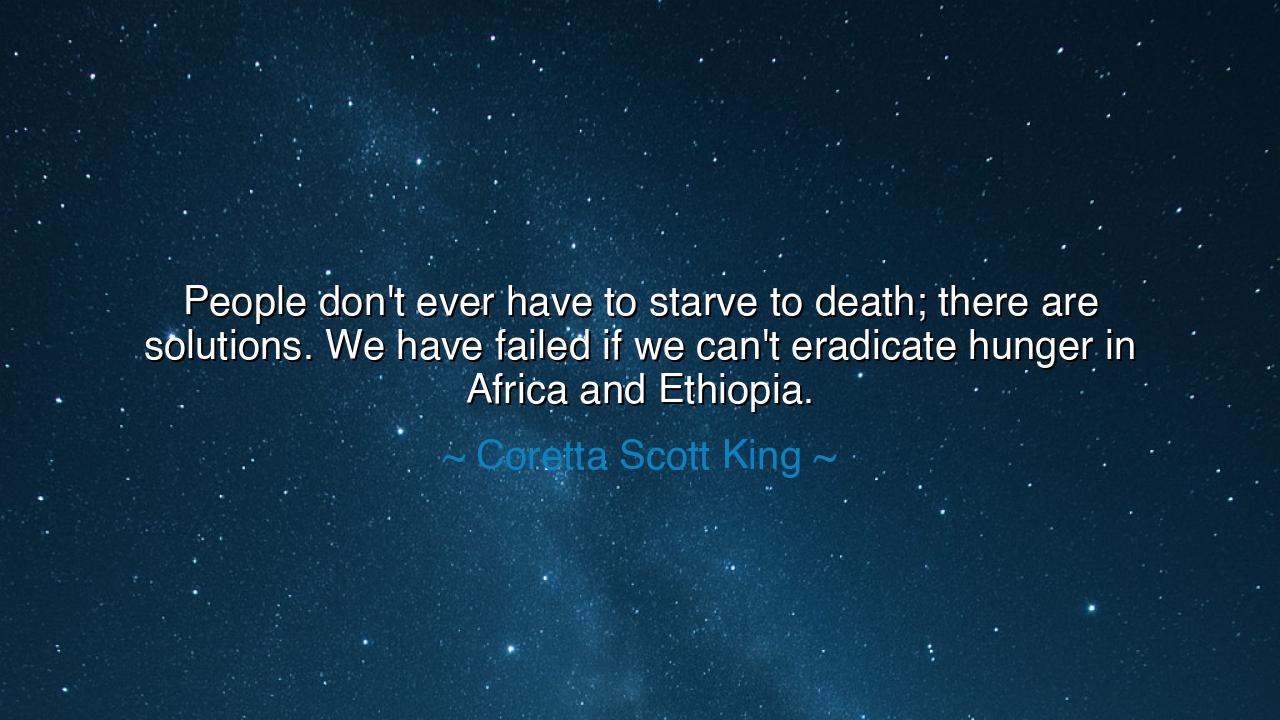
People don't ever have to starve to death; there are solutions.
People don't ever have to starve to death; there are solutions. We have failed if we can't eradicate hunger in Africa and Ethiopia.






“People don't ever have to starve to death; there are solutions. We have failed if we can't eradicate hunger in Africa and Ethiopia.” These words of Coretta Scott King are not a mere lament but a thunderous call to the conscience of humankind. They carry the grief of a mother, the courage of an activist, and the divine impatience of one who has seen too much suffering. In them lives the voice of justice, echoing from her husband’s dream, now extended to the suffering of the world. She speaks as one who knows that hunger is not fate, but failure — not a curse of nature, but a wound inflicted by neglect and greed.
The origin of this quote arises from the fire of the civil rights movement, reborn into a universal struggle — the right not only to dignity and equality, but to life itself. For what is freedom if a person cannot eat? What is justice if children perish from want while others waste food in abundance? Coretta Scott King saw clearly that the cry for bread and the cry for liberty are one and the same. Her words remind us that starvation is not the will of heaven, but the result of human choices — choices that can, and must, be changed.
In the years she spoke these words, Ethiopia stood as a symbol of human suffering. The famine of the 1980s left millions on the brink of death. The world watched — some with tears, others with apathy — as the earth cracked beneath the weight of drought and despair. Yet even in that darkness, light was born. People rose from every nation to help: farmers, musicians, and ordinary souls gave what they could. The song “We Are the World” was sung not as entertainment, but as a prayer — a declaration that compassion can cross oceans, and that the hearts of many can unite to feed the few. And yet, Coretta’s words endure because the battle was not won; hunger still lingers where abundance reigns.
To the ancients, the sharing of food was sacred. Bread broken among friends was a symbol of peace. To deny a man food was to deny him his humanity. In many tribes and kingdoms, it was said that the gods judged not the rich by their wealth, but by the mouths they fed. Yet in our modern world, the divine law of generosity has been forgotten beneath the noise of profit and pride. The Earth gives enough for all, but men take more than they need. The rivers dry not because they cease to flow, but because greed dammed them. Hunger, then, is not a mystery of nature — it is a failure of the spirit.
Coretta’s words pierce deeper still: “We have failed.” There is no escape in her phrasing, no comfort in excuses. She includes herself, as all great leaders do, within the circle of responsibility. For the measure of a civilization is not its wealth, but its compassion; not its armies, but its ability to feed the hungry. A society that sends rockets to the stars but lets its children starve upon the earth is like a tree whose branches reach to heaven while its roots rot below. True progress must nourish both body and soul.
But the message is not one of despair — it is a call to action. There are indeed solutions: sustainable farming, fair trade, education, empowerment of women, and the wise stewardship of the Earth’s bounty. Yet these solutions demand not only policy, but heart. Each person must become a sower of mercy — planting kindness in the soil of daily life. To waste less, to share more, to support those who labor to feed the world — these are not small acts, but sacred ones. The smallest seed, when planted in compassion, grows into a forest of change.
So, my child of tomorrow, take this wisdom to heart: no one should die hungry in a world so full. The fruit of the earth belongs to all who draw breath. Let your life be a vessel of generosity. Feed the hungry not only with bread, but with dignity. Fight the systems that hoard and exploit. Let your table be open, your heart wide, your conscience awake. For when every person eats, the world is at peace; and when one soul starves, all humanity is diminished. Remember this truth, and live so that no one — in Africa, Ethiopia, or anywhere under the sun — is left to perish in silence.






AAdministratorAdministrator
Welcome, honored guests. Please leave a comment, we will respond soon